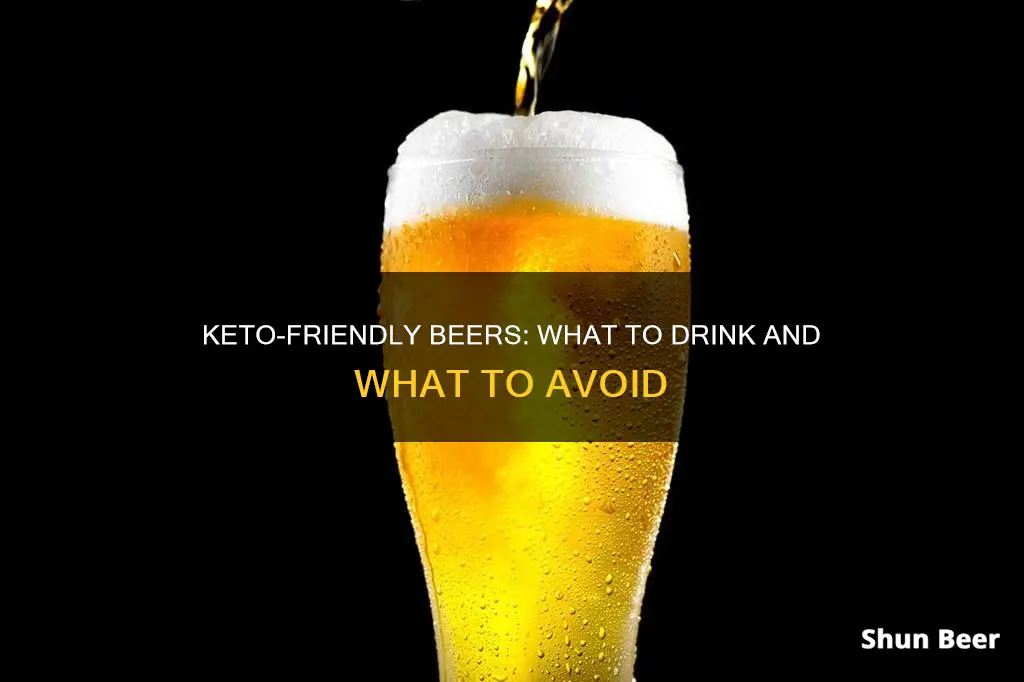
The ketogenic diet is a high-fat, low-carbohydrate diet that aims to make the body burn fat for energy instead of glucose. While on a keto diet, it is important to monitor your carbohydrate intake and choose low-carb options to remain in a state of ketosis. Most beers are not keto-friendly due to their high carbohydrate content. However, some light beers are low in carbs and can be enjoyed in moderation while on a keto diet. These include Corona Premier, Miller Lite, Coors Light, Budweiser Select 55, and Michelob Ultra, among others. It is important to note that the effects of alcohol may be stronger while on a keto diet, and it is recommended to drink in moderation. Additionally, those using the keto diet to treat a medical condition are advised to avoid alcohol.
What You'll Learn
- Pure spirits like gin, vodka, and whiskey contain zero carbs
- Beer is usually high-carb but some light beers are keto-friendly
- Wine is much lower in carbs than beer, so most people on keto choose wine
- Cocktails are often high-carb, but low-carb mixers are available
- Alcohol can affect your keto diet by slowing down ketosis and increasing weight gain

Pure spirits like gin, vodka, and whiskey contain zero carbs
Pure spirits such as gin, vodka, and whiskey contain zero carbs and are therefore suitable for a keto diet. However, it is important to note that while these spirits themselves do not contain carbohydrates, they can be mixed with other beverages that do. For example, tonic water, juice, and soft drinks are all high-carb mixers that can quickly turn your zero-carb drink into a high-carb one. Instead, it is recommended to mix your spirits with low-carb options such as soda water, diet tonic water, or powdered flavour packets.
It is also important to remember that alcohol can affect your judgment and willpower, and this effect may be more pronounced when following a keto diet. Alcohol can also slow down weight loss, as it is an energy source that your body prioritizes over burning body fat. Additionally, alcohol can stimulate your appetite and decrease your inhibitions, leading to increased food intake. Therefore, while pure spirits can be a keto-friendly option, they should still be consumed in moderation as part of a balanced diet.
Root Beer and Cola: What's the Difference?
You may want to see also

Beer is usually high-carb but some light beers are keto-friendly
Beer is usually high in carbohydrates, which can kick you out of ketosis and negatively impact your keto diet. However, some light beers are keto-friendly, containing fewer than 7 grams of carbohydrates per serving. These include:
- Coors Light Lager Beer
- Kona Brewing Kahana Blonde Ale
- BrewDog Vagabond Pale Ale
- Lakefront Brewery Eazy Teazy Ale
- Corona Premier
- Miller Lite
- Busch Light
- Beck's Premier Light
- Budweiser Select 55 Premium Light
- Miller 64 Extra Light Lager
- Michelob Ultra Pure Gold
- Devil's Backbone Bright Tangerine Sparkling Ale
These light beers can be consumed occasionally without completely derailing your keto diet, as long as you stay within your daily carbohydrate allowance. However, it's important to note that the effects of alcohol may be stronger while on a keto diet, and alcohol consumption can slow down weight loss. Additionally, people following a keto diet to manage a medical condition should avoid alcohol altogether.
Beer and Food Poisoning: Safe Drinking After Recovery?
You may want to see also

Wine is much lower in carbs than beer, so most people on keto choose wine
If you're on a keto diet, it's important to know that alcoholic drinks contain calories that your body uses before it burns body fat. Alcohol doesn't help with weight loss, and the more you drink, the harder it is to lose weight. Alcohol can also make you want to eat more.
There is a big difference between drinks when it comes to their carb content. Wine is much lower in carbs than beer, so most people on keto choose wine. A typical glass of champagne or sparkling wine contains 2 grams of net carbs, while a glass of red or white wine has around 2 grams of net carbs. Sweeter wines, like Rieslings and Gewurztraminers, have about 4 grams of carbs per glass.
Beer, on the other hand, is made from grains, which provide a lot of rapidly digestible carbs. Most beers are bad for weight control and should be avoided on keto. A typical bottle of beer contains 13 grams of net carbs. However, there are some very light American beers with fewer carbs that can be consumed occasionally without derailing your keto diet. These include:
- Select 55
- Michelob Ultra
- Select Premium Light
- Busch Light
- Natural Light
- Miller Lite
- Bud Ice
- Coors Light
If you're on a keto diet, it's best to choose low-carb and low-calorie drinks. Wine and pure spirits like whiskey and vodka are the lowest in carbs, while beer and sweet mixed drinks are the highest. So, if you're looking for a drink to enjoy on a keto diet, wine is usually the better choice.
Pets and Beer: What's the Deal?
You may want to see also

Cocktails are often high-carb, but low-carb mixers are available
While cocktails are often packed with carbohydrates, there are ways to reduce the carb count. The key is to use low-carb mixers. Carbohydrates are made out of sugar, so the more sugar in a cocktail, the more carbs there will be.
Most liquors, like rum, tequila, vodka, and whiskey, have little to no carbs on their own. But when you start adding juices, syrups, and mixers, the carbs start to add up.
So, what are some good low-carb mixers? Here are a few options:
- Diet tonic
- Diet ginger beer
- Soda water
- Sugar-free or unsweetened juice
- Diet soda (e.g. diet Coke, diet Sprite, diet ginger ale)
- Zero-carb flavoured water (e.g. Crystal Light, Sparkling ICE, La Croix)
- Sugar-free syrup (e.g. Da Vinci, Walden Farms)
With these mixers, you can create ultra-dry, simple cocktails that are low-carb, such as a vodka soda, gin rickey, dry martini, or gin and tonic. You can also make low-carb versions of classic cocktails by making a few simple substitutions. For example, you can swap out sugary ingredients for low-carb simple syrup or sugar-free syrup.
- Vodka soda
- Gin and tonic (with diet tonic)
- Manhattan: Swap out the sweet vermouth for dry vermouth and replace the maraschino cherry with an orange peel
- Ranch Water: Tequila, lime juice, and seltzer
- Tomato Tini: Gin, tomato, and botanical flavours
- Skinny Margarita: Tequila, lime juice, orange juice, and agave (instead of Cointreau and Triple Sec)
- Vodka tonic: Vodka and diet tonic
- St. Germain Spritz: St. Germain, dry sparkling wine, and soda water
- Prosecco Mint Julep: Dry sparkling wine, bourbon whiskey, and low-sugar simple syrup
- Spiked Sparkling Basil Lemonade: Vodka, low-carb lemonade, and diet ginger ale
- Moscow Mule: Vodka, homemade low-sugar ginger simple syrup, lime juice, mint leaves, and diet ginger ale
- Gimlet: Gin, low-carb sweetener, lime wheel, and lime zest
- Dark 'N' Stormy: Dark rum, lime, and sugar-free ginger beer
- French 75: Champagne, gin, and low-carb simple syrup
- Bloody Mary: Vodka, unsweetened tomato juice
- Mojito: Rum, low-carb simple syrup, lime juice, soda water, and mint
- Paloma: Tequila, lime juice, soda water, and low-sugar grapefruit soda (instead of grapefruit juice and agave syrup)
- Tom Collins: Gin, lemon juice, soda water, and low-sugar simple syrup
- Gin Fizz: Gin, lemon juice, egg whites, seltzer, and low-carb sweetener
- Cosmopolitan: Vodka, orange extract, sugar-free cranberry juice, and low-carb sweetener (instead of Cointreau and cranberry juice)
- Vodka Martini: Vodka or gin
So, if you're looking to enjoy a cocktail while sticking to your keto diet, give one of these low-carb options a try! Just remember to always drink in moderation and be mindful of your daily carb intake.
Beer and Isosorbide Mononitrate: A Risky Mix?
You may want to see also

Alcohol can affect your keto diet by slowing down ketosis and increasing weight gain
The keto diet is a popular, low-carbohydrate, high-fat diet that induces a state of ketosis in your body. Ketosis is a metabolic process that occurs when there are not enough carbohydrates for your body to burn, so it burns fat. The liver converts stored fat into ketones, which are usable forms of energy.
Alcohol can interrupt this process. Firstly, alcohol is considered the fourth macronutrient, along with fat, carbs, and protein. It contains 7 calories per gram, and consuming too much can contribute to weight gain. Additionally, alcoholic drinks often contain high concentrations of sugar, which can quickly take you out of a ketogenic state.
Secondly, alcohol metabolism is prioritized over ketone production in the liver. The body processes alcohol first to reduce its negative impact, temporarily delaying ketone production and fat burning. This means that even if you consume a no-carb alcoholic drink, your body will still prioritize metabolizing the alcohol over burning fat.
Thirdly, alcohol can affect your decision-making and willpower. It can reduce your inhibitions, making you more likely to give in to cravings for non-keto foods and drinks. This can lead to consuming more calories and disrupting your diet.
Finally, alcohol can also affect weight loss by suppressing fat burning and increasing the storage of unwanted extra calories as fat tissues. Studies have found a link between increased daily alcohol consumption and significant weight gain.
Therefore, if you are following a keto diet, it is important to be mindful of the type and amount of alcohol you consume. Pure forms of alcohol that are low in sugar and total calories, such as clear liquors like vodka, gin, or tequila, are better choices. Additionally, maintaining a caloric deficit, even after consuming alcohol, is essential for weight loss.
Drinking Beer at Whole Foods: What You Need to Know
You may want to see also
Frequently asked questions
Yes, you can, but it is generally advised to opt for light beers as they are usually low-carb. Some examples include Coors Light Lager Beer, Corona Premier, and Miller Lite.
Yes, pure spirits such as gin, whiskey, vodka, and tequila are suitable as they are low-calorie and contain zero carbs and added sugar. Dry wines, including red, white, and sparkling varieties, are also good options as they have fewer carbs and sugar than dessert wines.
It is recommended to use low-carb mixers such as soda water, diet soda, sugar-free tonic water, and diet cola. These mixers are low in calories and do not contain carbs or sugar.
Alcohol can affect weight loss by slowing down the rate of ketosis and suppressing fat burning. It can also increase weight gain by storing extra calories as fat tissues.
Light to moderate beer intake has been linked to a lower risk of heart disease and improved blood sugar control. However, heavy drinking can have adverse effects, including an increased risk of heart disease, stroke, and liver disease.







